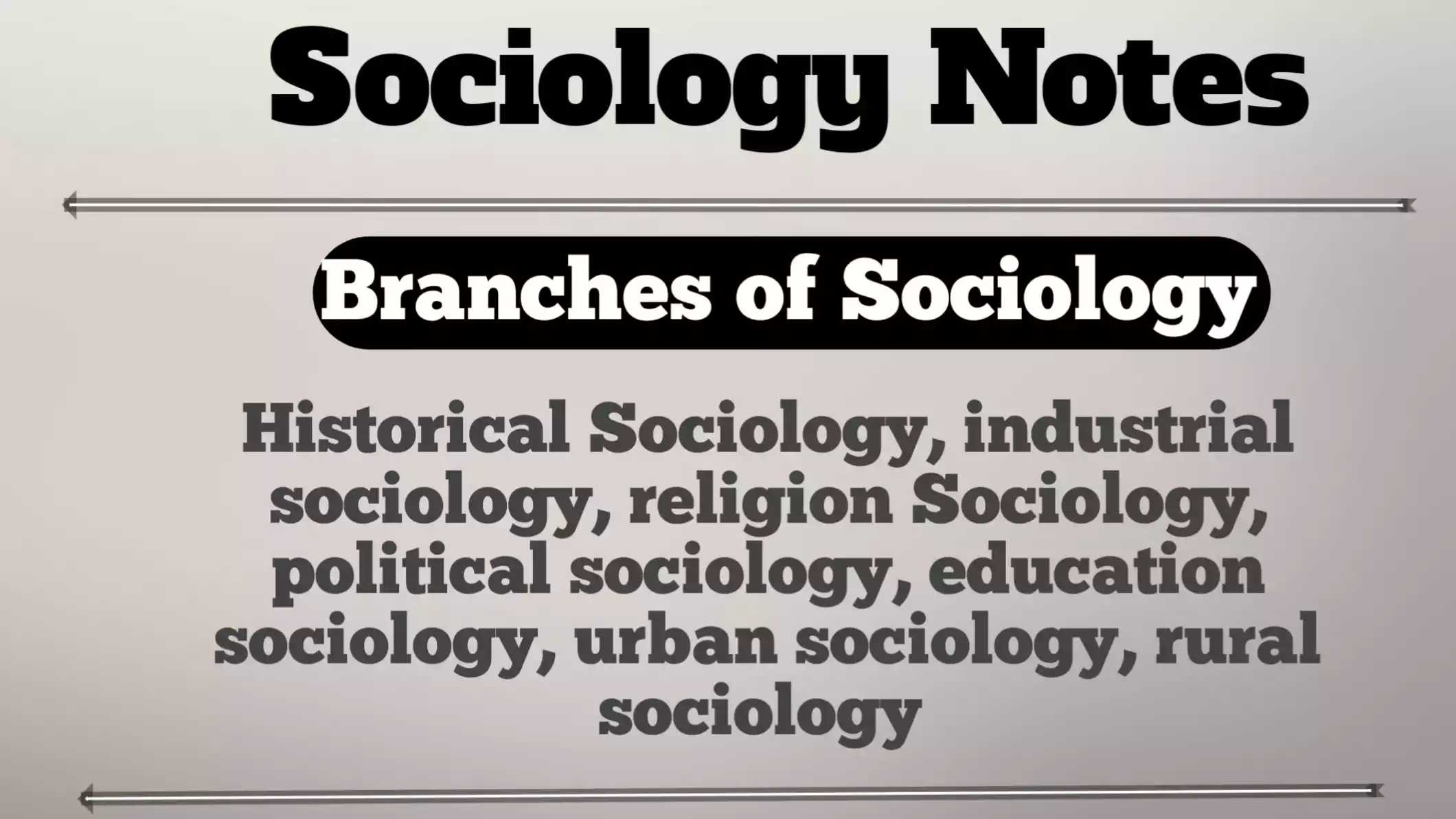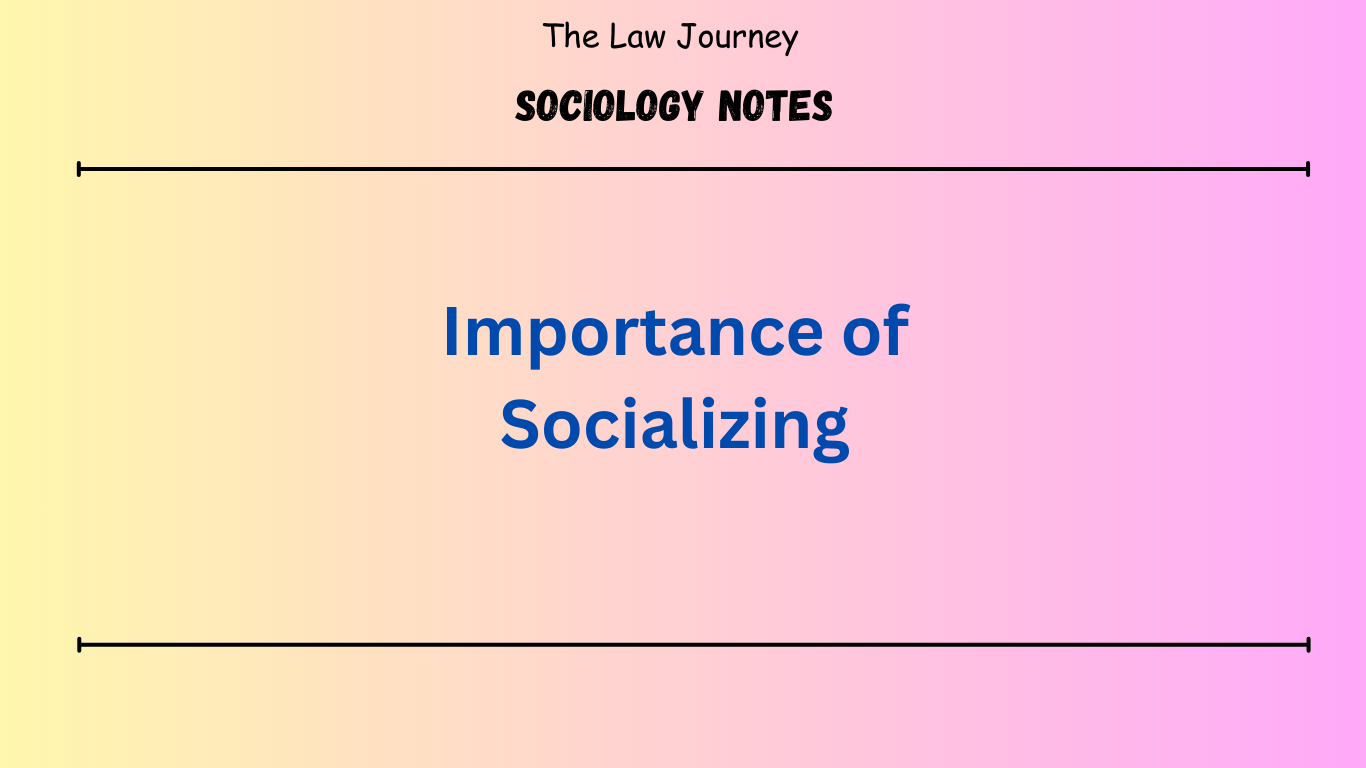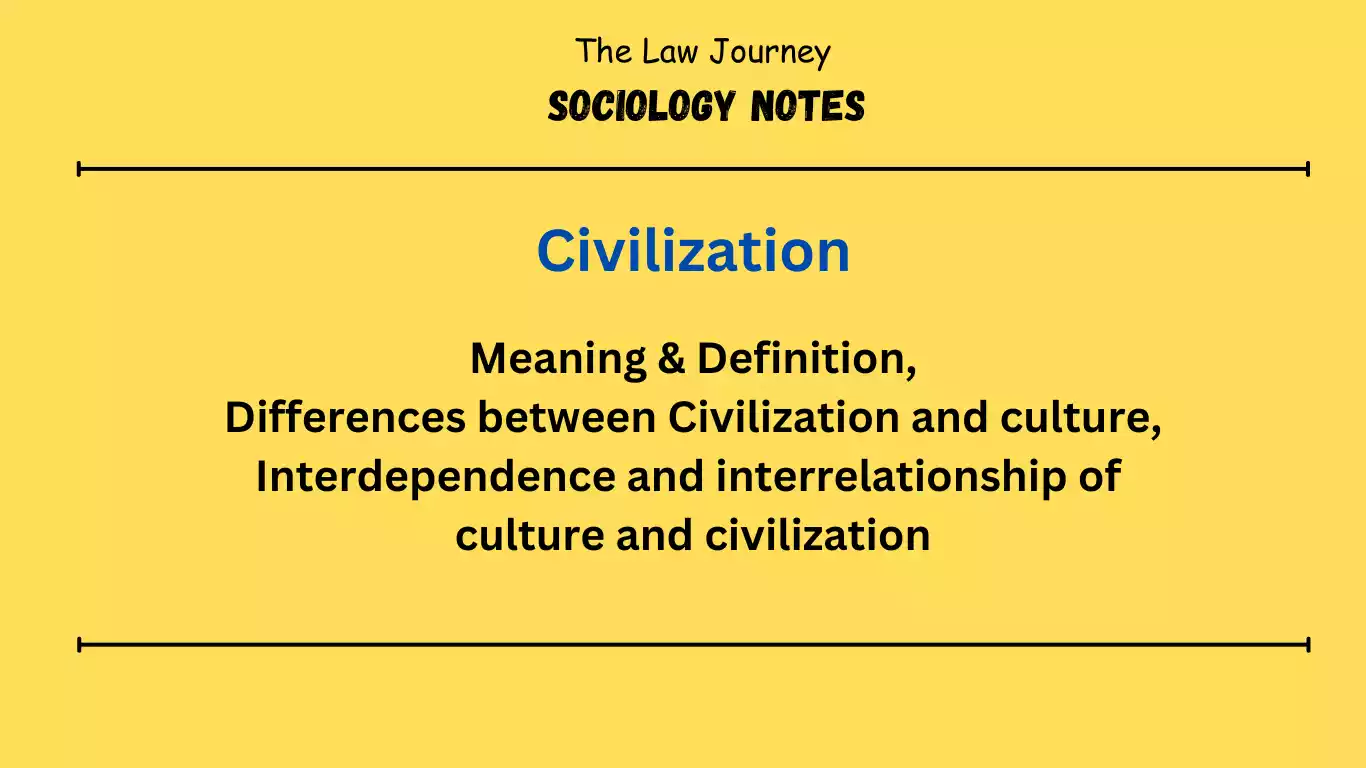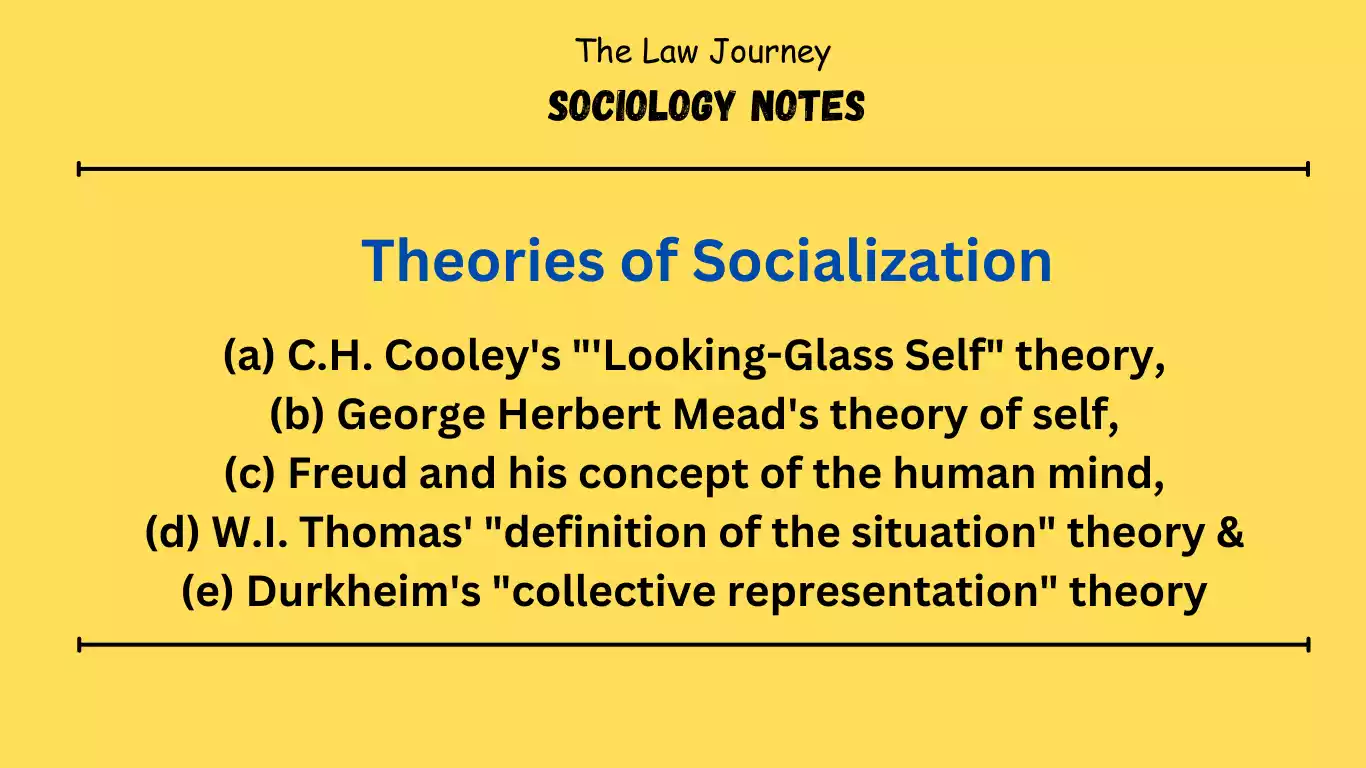Branches of Sociology – Sociology is a rapidly growing discipline. Sociologists strive to include almost all aspects of human social life in their research. Sociology tends to fall into an endless list of disciplines. Therefore, there are several specialties in research, each of which can apply its own approach and techniques. Here is a small attempt to showcase some of the main areas and specialties of research.
Historical Sociology – Sociology of Knowledge – Sociology of Law – Social or Human Ecology – Sociology of Education – Political Sociology – Sociology of Economic Life – Occupational Sociology – Sociology of Religion – Rural Sociology – Industrial Sociology – Urban Sociology
Historical sociology | Branches of Sociology
Historical sociology has developed as a branch of sociology. In some sense all sociological research is historical, as sociologists usually deal with records relating to events that have happened or been observed. “However, the term historical sociology is commonly used for the study of social facts over fifty years ago.”
In fact, historical sociology has become a special form of comparative study of social groups. It examines social groups, their composition, their interrelationships, and the social conditions that support or undermine them. When social anthropologists consider these matters in contemporary simple societies, historical sociologists consider them in relation to the record of earlier societies and their cultures.
There are also historians like Rostovzer, G.G. Coulton and Jacob Burckhardt wrote social histories. “Social history is the history of human relationships, social forms, customs and customs, important institutions, etc., other than the monarchy and the military.” Social history has become “the history of the people ignoring politics.” “Now it is the history of men and women in social relationships and groups.”
Social history has not yet established itself as an independent discipline. Social history, on the other hand, is widely accepted among sociologists. They realize that the past is important in interpreting the present. Social history is recognized by sociologists as “historical sociology”.
Today it is one of the standard specialties of sociology. Sigmund Diamond, Robert Vera, and Norman Brimbaum are among the important practitioners of contemporary historical sociology.
Sociology of knowledge | Branches of Sociology
Sociology of knowledge is one of the new branches of sociology. This branch presupposes the notion that “our knowledge is in some sense a social product”. Thinkers have long recognized the importance of economic, religious, political and other interests in shaping human beliefs and ideas. More recently, the view has become well recognized that human societies and even their structures can influence knowledge.
Greek and Roman histories in particular strongly support this view. In his book The New Science (1725), Vico attempted to show how heroic literature constituted the thinking of a particular kind of society.
Marxism raised the question of the relationship between society and knowledge, and also provided a solution to this. “
According to Marx and Engels, all knowledge was distorted, directed and conditioned by the conscious and unconscious interests of opposing exploiting classes and exploiting classes.” In the light of contemporary sociological information , this view as a holistic sociology of knowledge proved untenable.
Durkheim tried to deal with this problem in his own way.
In Basic Forms of Religious Life (1912) and Sociology and Philosophy (1952) (translated papers), he argues that our cognitions and experiences derive from and are part of social structures. claimed to form a department. This line of thinking may be appropriate for simpler societies, but it is not true for complex societies either. The three stages of Comte’s social evolution are already regarded as stages of thought-form, of which only the last stage, the positivist stage, is objective.
The foundations of the sociology of knowledge can be found in Karl Mannheim’s 1936 Ideology and Utopia and his 1952 essay on the sociology of knowledge. Mannheim attempted to “face the problem of the sociology of knowledge with great philosophical erudition and methodological ingenuity.”
Sociology of Law
Sociology of law conceives of law and legal institutions both as part of society and as social institutions that change in relation to other institutions. She sees law as a means of social control. Therefore, laws are often associated with a moral order, a set of customs and ideas about society. From this point of view, the sociology of law itself becomes related to jurisprudence. Still, it differs from jurisprudence. Sociology of law definitely requires an understanding of the legal system.
But the range is much wider. Its aim is to “understand the relationship between the legal system and other social subsystems such as the economy, the types and distribution of powers, and the structure of family and kinship relationships.”
In Britain, several social anthropologists have studied the legal system, Attempts to determine relationships with other aspects of the social system in a relatively simple social court.
The study of “legal sociology” is well known in Europe, but not in America or England.
In fact, sociologists have paid little attention to the sociology of law in contemporary society. Previously, Durkheim (by categorizing law into retribution and retribution) and Max Weber (through his translated work, A Study of Wilschaft and Gesellschaft) did the early work in this area.
Austrian scholar E. Ehrlich published one of his finest works on the sociology of law in 1913, translated into English in 1936 under the title Basic Principles of the Sociology of Law. Another famous work of his is The Sociology of Law by Georges Gavich, published in 1942.
There is a great deal of interest in the sociology of law today, thanks to the work of some American jurists. Because of this growing interest, only a few sociologists and legal scholars came together to write an interesting work in 1962 entitled Society and Law: New Meanings of Ancient Professions.
social ecology or human ecology
Ecology is a branch of biology that primarily deals with the environment of lower animals and plants. Refers to the influence of the environment on the ecology of animals. Sociologists who have adopted the approach of these scientists to the study of communities refer to their field as “human ecology” or “social ecology.” Botanists also provided basic principles, concepts, and terminology to sociologists.
The study of human ecology is nothing but a logical extension of the ecological perspective. Human ecology is the field of sociology that studies human adaptation to the environment. This includes not only the physical conditions of the geographical environment, but also other living things such as other humans, plants, and animals. that person, that topic
Human ecology is less constrained by the physical environment. Humans can live almost anywhere on the planet with the help of culture. He grew and produced different types of food, wore different types of clothing, built houses, bridges, dams, created tools and devices for different purposes, killed dangerous animals, Pesticides can be used to get rid of harmful insects.
Social ecologists have focused on communities. Using communities as units of observation makes it easier and more productive to study ecological factors. Ecology studies communities in relation to their environment.
Culture changes the influence of the natural environment, and as culture changes so do communities. Ecological approach: The ecological approach to studying communities is Previously used primarily by American sociologists.
Park and Burgess were pioneers in the field of human ecology. She and her students, Mekenzie, developed the basic principles. They made it a field of study in sociology. Later, this approach was used very usefully by sociologists outside the “Chicago School.”
Educational Sociology | Branches of Sociology
Educational sociology is one of her special areas of sociological research. Analyze educational institutions and organizations. It investigates the functional relationship between education and other major institutional orders of society, such as the economy, community, religion, and kinship. It focuses on educational systems and subsystems, or individual schools and universities. Sociology of education considers “education” as a means of transmitting culture.
We also consider the functional implications of education. Examines school organization and the relationship between schools and social structures, particularly social class, family, and neighborhood. The interaction of these social forces with the internal organization of schools is investigated to uncover the social determinants of education. Research shows that social class and its correlations have a systematic impact on educational attainment and educational choices.
In England, for example, middle-class children are six times more likely to graduate from college than working-class children. Despite equal opportunities for all, social determinants of academic success are still in force in the modern education system. The theoretical concept of “meritocracy”, the domination of educated and talented people, must be understood in this context. Sociological research on higher education has increased since 1950.
Sociology of education emphasizes the social importance of education. The social importance of education is now widely recognized, especially in modern industrial society. In such societies, education has become a means of acquiring social and technical skills. Education is now not only a means of training people to work in different fields, but also a qualification for working in a particular field.
Suitable for increasingly specialized roles Moreover, today education has become essential for recording progress in the field of science and technology. Therefore, it is a means of promoting economic prosperity. Education as a means of bringing about social change is equally important. It facilitates social mobility, the movement of people from one social status to another.
It affects social class. In totalitarian and communist countries, education is often used as a tool to spread xenophobic and communist ideology.
Political Sociology
Since the time of Aristotle, thinkers have dealt systematically with concrete political phenomena. They have observed how political phenomena influence and are influenced by other social structures and cultures. In this respect, Aristotle’s Politics can be considered a work of political sociology. Ferguson, Montesquieu, and Tocqueville all engaged in what is today called political sociology.
Classical sociologists such as Weber (essay Politics as a Vocation) and Pareto (writing Spirit and Society) were pioneers in incorporating political sociology into research.
In addition, Karl Marx in Germany, Mosca in Italy, and Graham Wallace in England developed essentially sociological theories about political elites and processes of agreement and disagreement. Prior to 1914, André Siegfried of France also made a detailed study of this social group and their concerns about their voting behavior.
The term “political sociology” to describe this tradition was not commonly used until after 1945. Since the birth of sociology, the analysis of political processes and institutions has been one of its most important concerns. Sociologists argue, and many political scientists agree, that political processes are difficult to study except in the special case of more general psychological and sociological relationships.
The term “political sociology” is entrenched in both sociology and political science and encompasses the overlap between the two sciences. However, political scientists are primarily concerned with the dimensions of power and the factors that influence its distribution.
Sociologists, on the other hand, are more interested in social control, or how a society’s values and norms regulate relationships. Its focus is on social bonds rather than formal structures or legal definitions.
Economic Sociology or Economic Life Sociology
Economic sociology, or the sociology of economic life, is a new branch of sociology. Economic sociology, As Neil J. Smelser defines, economic sociology is “the application of the general frame of reference, variables, and explanatory models of sociology to that complex of activities concerned with the production, distribution, exchange, and consumption of scarce goods and services.”
The first focus of economic sociology is exclusively on economic activity. Economic sociologists investigate how these activities are structured in roles and groups. He asks what values justify these activities, what norms and sanctions regulate them, and how these sociological factors and variables interact.
The second focus of economic sociology is on the relationships between sociological variables or factors that appear in both economic and non-economic contexts. For example, how does the role of the family relate to the occupational role of a community and the control of its political structure?This focus includes the mutual integration of economic and non-economic structures. Both situations are included.
This interaction of sociological variables or factors in the economic and non-economic spheres can be observed in two ways:
(i) within a concrete economic unit; For example, in an industrial company, economic sociologists investigate status systems, deviations in power and authority relations, factions and coalitions, and the relationships between these phenomena. In fact, “industrial sociology” focuses more on this point.
(ii) between the economic entity and its social environment; At one level, economic sociologists study the relationship between economic interests and other interests (legal, political, family, religious) in both communities and the larger society. At a higher level, it studies the relationship between the economy (considered as the analytical system of society) and other systems. “This cross-cutting focus leads to the ‘larger themes’ of economic sociology. Public Order, Labor Conflicts, Relations Between Economic Classes – Based on the Marxist and Weberist Traditions of Thought.
Finally, economic sociologists examine the central economic variable itself, specifically the sociological aspects of money as one of the different types of sanctions in social life.
Subdivisions of Economic Sociology: Economic sociology has its own subdivisions. These include (a) labor sociology, (b) labor sociology, (c) sociology of complex organizations (at least the part dealing with economic bureaucracy), (d) industrial sociology, and (e) plant sociology. , (F) includes consumer sociology. and so on.
Related Post | Branches of Sociology
- Concept of Social Groups in Sociology
- Legal History Notes
- RTI notes
- Political Notes
- Law of Torts notes
- law project maker
- moot court memorial maker
Historical sociology ?
Historical sociology has developed as a branch of sociology. In some sense all sociological research is historical, as sociologists usually deal with records relating to events that have happened or been observed. “However, the term historical sociology is commonly used for the study of social facts over fifty years ago.”
Political Sociology ?
Since the time of Aristotle, thinkers have dealt systematically with concrete political phenomena. They have observed how political phenomena influence and are influenced by other social structures and cultures.
Reference Books | Branches of Sociology
- C.N. Shankar Rao – Principle of sociology with an introduction to social thoughts
- Introduction to Sociology by Anthony Giddens
- A Dictionary of Sociology by John Scott
- Sociological Theory by George Ritzer
- Handbook of Indian Sociology by Veena Das
- Social Change in Modern India by M N Srinivas

















